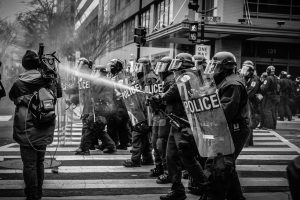
PART 1: The Problem
A good friend of mine asked me this question and I answered simply: We must help people be less emotional before they can discuss anything logically. You see, once the brain is flooded with chemicals due to emotionally charged situations, it stops functioning. Given that the part of the brain affected by these chemicals (frontal lobe) is in charge of rational thought, what I’m actually saying is that reason, thinking, and the ability to discuss anything logically becomes impossible. THIS is why people say – let your partner or friend cool off during a fight before you discuss ways to fix the situation. This is also why we all say things we regret in the heat of the moment. It is also why we forget how to speak when we are nervous in front of a crowd or a potential new partner. All of these moments have one thing in common: emotions that trigger chemicals to release and shut down our logic centers.

These issues can be hard enough to manage when two people are involved. When the number of people increases, the potential conflict points increase exponentially in difficulty. Why? Because every extra person adds not just his or her emotions to every situation, but also reacts to the people around them. So in a marriage, for example, you have person 1, person 2, and the interaction between them (#3). Add one child and now you have person 1, person 2, person 3, interaction between 1 and 2 (#4), interaction between 2 and 3 (#5), interaction between 1 and 3 (#6), reaction of person 3 to the interaction of 1 and 2 (#7), reaction of person 2 to the interaction of 1 and 3 (#8), and reaction of person 1 to the interaction of 2 and 3 (#9). So with two people, you have 3 possible areas of conflict. Add one child and it escalates to 9. Add more and the possible areas of conflict just keep increasing at exponential rates.
Now…imagine all this on a national scale…and it should be no surprise that we have a giant mess of disagreement and potential conflict points available.

It used to be the case that when one was upset about something, that person went home, possibly vented to a family member, then slept on the issue. This separation time is incredibly important. Why? Because it allows the stress chemicals in the brain to drain. The following morning, one thinks more clearly.
That was then. This is now. The world is fast paced. Information flow is immediate. Why delay when you can vent immediately?
<ENTER SOCIAL MEDIA> 
Now, you can share your emotional, unvetted, completely raw, beliefs immediately. Not only do you get an extra rush of chemicals letting out your anger or frustration, you also get responses from others immediately…and…that’s right, another rush. The result of your one frustration not only makes your emotions high, it now increases the emotions of all those following you….who, in turn….share their frustrations with their entire network….and so on and so forth. One issue, that in the past would have faded while you slept, becomes a national epidemic of emotions in literally seconds now. Worse, the feeling of those chemical rushes is the same as one that takes drugs, seeks daring activities like jumping out of airplanes, or tries risky behaviors. So now, that one experience has not only affected your network of ‘friends’, the act of sharing also has you hooked on the chemical rush, and has you seeking more emotional situations that can start the cycle of chemical rush again and again and again. Eventually, your brain will reset itself permanently at a heightened state of agitation. At this point, you will need the rushes just to maintain a sense of balance.
Ironically, however, you will be constantly out of balance.
PART 2: The Fix
Fixing this national level epidemic of emotional turmoil is no small challenge. Simply telling people to calm down doesn’t work – most people don’t know how and frankly, self-control and delayed gratification can be difficult to employ when the chemical rush is so intense and elongated in time. Similarly, trying to speak reason to someone in a heightened emotional state is quite simply, a waste of breath. The person literally can’t digest what you are saying. The words will be simply filtered out of working memory as fast as they enter. This is why those who aren’t feeling that heightened sense of chaos and emotions can’t understand why friends who used to be pleasant to be around are no longer reasonable. It’s why many of the social media posts don’t even make sense at times. Ironically, it’s also why protests don’t work – they empower the people who already agree with you but act to further infuriate those who don’t.
As the people who, at one point were hanging on to their frustrations, reach the end of their ability to keep speaking logically, and reasonably without feeling heard…they will become sucked into the same emotional cycle out of pure frustration…and yell back. Once this happens, everyone is yelling AT each other – and no one is listening. Both sides are defending their position – though more times than not, people have forgotten what, specifically, they are fighting for…because really, they are fighting to be heard.
Our people want to be heard.
It’s surprising how simple it can be in the end. Most of us can accept a decision different than our own preference, but only if we feel heard and understood first.
So the answer to how to get politicians to stop yelling is….LISTEN. These are the steps:
- Stop talking, start listening: It is rarely the case that the person you’re talking to is as crazy as they sound at first. They are typically frustrated, angry, or feel wronged. Let them get it all out before defending, correcting, or explaining.
- Ask: If it’s the way you want it, what does that look like? Most times, people don’t even know what they want. They know they don’t like what they have but they don’t know what success looks like. You must name your goal, define mission success.
- Make sure you understand what they are asking for: One always need to make sure that you’ve understood correctly.
- Define steps: Clarify how (the steps) to reach the goal OR explain why it can’t be done. By this point, a person’s emotions have stabilized typically because they have been heard, they’ve redirected to a solution-focused mindset, and you’ve repeated back to them their own argument. So at this point, you should *finally* be able to discuss actual solutions to issues, instead of yelling so much.
At the national level, the solution is surprisingly easy too:
Don’t social media when you’re angry 😉
Ok, while it’s simple, it’s not easy to convince people to follow it. But for every person that does resist the urge, it’s not just one reduction in a network – it’s the ripple effects that don’t occur that allow peace, calm, and logic to rule and begin the cycle of unity.
Photo Credits: Andre Hunter, Jerry Kiesewetter, Ben White, William Ivan, Vlad Tchompaloy, and Spenser H on Unsplash

 Today is a day that brings another debate to our country: Celebrate the Indigenous people who inhabited our country first or Christopher Columbus who brought Europeans here in 1492? The issue of course lies in the extensive genocide that followed during the colonization of the Americas. This debate comes just shortly after the questions over the civil war monuments, making it even more heated. How do we balance remembering history with while acknowledging that much of our history involves significant loss of life – in our case, loss of Americans’ lives.
Today is a day that brings another debate to our country: Celebrate the Indigenous people who inhabited our country first or Christopher Columbus who brought Europeans here in 1492? The issue of course lies in the extensive genocide that followed during the colonization of the Americas. This debate comes just shortly after the questions over the civil war monuments, making it even more heated. How do we balance remembering history with while acknowledging that much of our history involves significant loss of life – in our case, loss of Americans’ lives.

 Certainly, it is possible to decimate an entire country with the launching of weaponry. So why don’t we just destroy countries that don’t act in a manner we wish them to? Why don’t we just destroy everything that doesn’t conform to our belief systems? Why don’t we just bully our way through the world and conquer it all?
Certainly, it is possible to decimate an entire country with the launching of weaponry. So why don’t we just destroy countries that don’t act in a manner we wish them to? Why don’t we just destroy everything that doesn’t conform to our belief systems? Why don’t we just bully our way through the world and conquer it all?




 Domestically – it depends on whether or not it is a single group or single individual versus a series of independent events/people. A single group (e.g., gang) or a person (e.g., spouse) can control the frequency and intensity of their actions to maintain your fear. Essentially, they can expend just enough effort to make you afraid without extending beyond necessary. They can also edit based on you personally. However, serial domestic terrorists usually have a personal goal, which may or may not be ever known to the public. Though these people never formally coordinate with each other, or even more likely never meet, the national public is nonetheless affected by the impact of their actions, not as singular events but as a combination. The media acts as a support unit and connector of these events – inadvertently, yet exponentially, increasing their impact. You see, it’s not just about each event, it’s about the commonality and patterns between them. Even if patterns don’t exist, people will try to find them. Imagine what would happen if no one acknowledged mass shootings. We can’t of course, because to do so would suggest we don’t value the victims. And we truly value and respect the loss to family and friends. But for argument sake, imagine if we
Domestically – it depends on whether or not it is a single group or single individual versus a series of independent events/people. A single group (e.g., gang) or a person (e.g., spouse) can control the frequency and intensity of their actions to maintain your fear. Essentially, they can expend just enough effort to make you afraid without extending beyond necessary. They can also edit based on you personally. However, serial domestic terrorists usually have a personal goal, which may or may not be ever known to the public. Though these people never formally coordinate with each other, or even more likely never meet, the national public is nonetheless affected by the impact of their actions, not as singular events but as a combination. The media acts as a support unit and connector of these events – inadvertently, yet exponentially, increasing their impact. You see, it’s not just about each event, it’s about the commonality and patterns between them. Even if patterns don’t exist, people will try to find them. Imagine what would happen if no one acknowledged mass shootings. We can’t of course, because to do so would suggest we don’t value the victims. And we truly value and respect the loss to family and friends. But for argument sake, imagine if we
